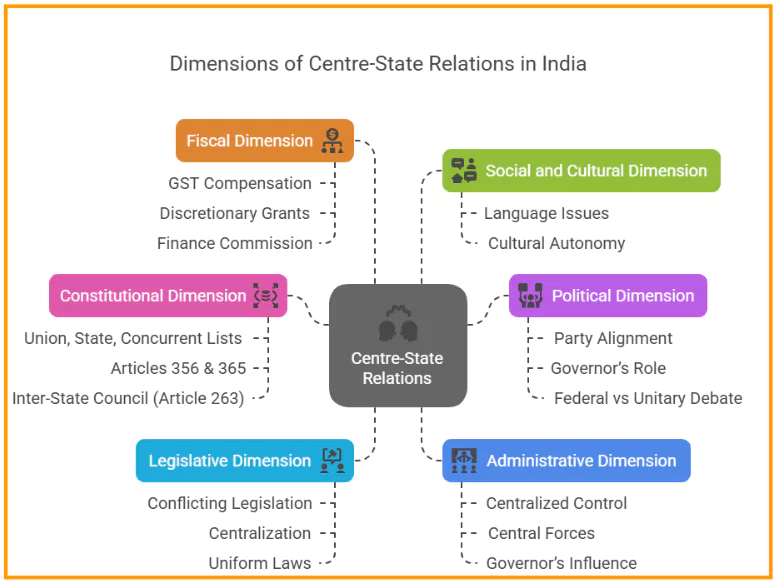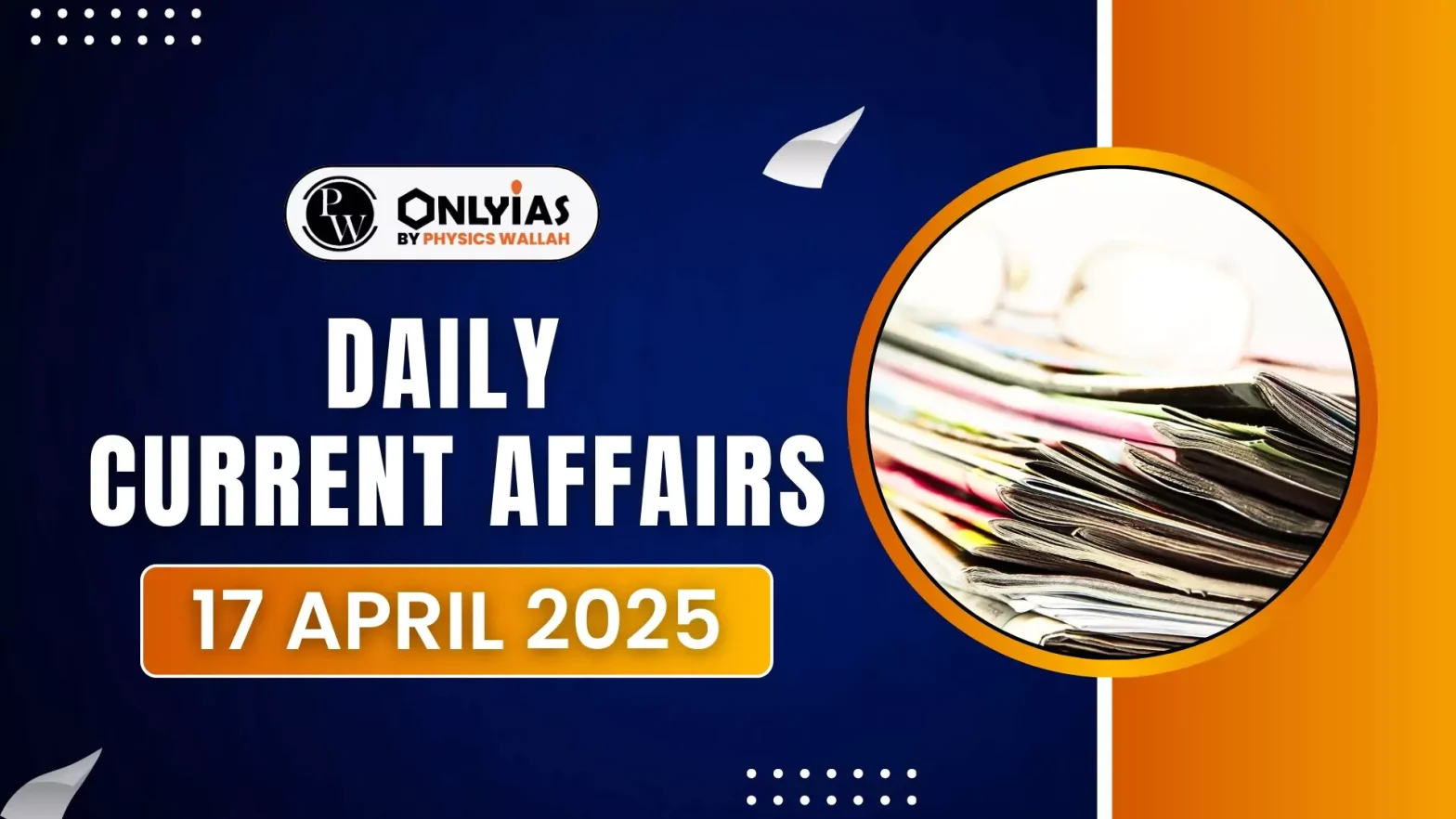The Tamil Nadu Chief Minister (CM) M.K. Stalin announced the formation of a high-level committee under Justice Kurian Joseph, a former Supreme Court judge, to re-examine Centre-State relations.
- The move revives a long-standing federal discourse, echoing the Rajamannar Committee set up in 1969 by then CM C.N. Annadurai a federalist and leader of the Dravidian movement.
- The newly constituted committee aims to review the legal and constitutional framework governing Union-State dynamics and recommend steps to protect state autonomy.
- The announcement comes amidst disputes between Tamil Nadu and the Centre over:
- NEET (National Eligibility-cum-Entrance Test)
- GST compensation
- Delimitation proposals
- Language policy imposition
- This development is rooted in concerns about the erosion of state autonomy, and reflects persistent tensions between Union and State governments especially when ideologically different parties rule at each level.
Challenges in Centre-State Relations
- Centralizing Tendencies: Articles 356 (President’s Rule) and 365 (compliance with Union directions) have often been criticized for allowing the Centre to dismiss or interfere with state governments.
- Example: Multiple conflicts between the state and Centre over governor’s interference (West Bengal, Punjab, Tamilnadu, Kerala, etc in between 2021-2024) and refusals to assent to bills showed how central authorities (governors appointed by the Centre) can be used to stall or undermine state governments.
- Financial Dependence: States depend on the Centre for funds via Finance Commission recommendations, but even more for discretionary grants and Centrally Sponsored Schemes (CSS).
- Example: Several states, including Tamil Nadu, Kerala, and Punjab, protested delays in GST compensation by the Centre.
- Planning and Policy Overreach: Though the Planning Commission was replaced by NITI Aayog, critiques remain about central dominance in resource allocation and planning.

-
- Example: Tamil Nadu and Kerala have expressed concerns that NITI Aayog is advisory only in name, but functions as a central oversight mechanism in state domains such as education, health, water policy, etc.
- Political Partisanship: When different political parties govern the Centre and States, friction over implementation, funding, and law enforcement is common.
- Example: Tamil Nadu passed legislation to exempt NEET, citing rural student concerns, but the Governor withheld assent and sent it to the President, delaying implementation.
- Delhi vs. Centre (2023-2024): Disputes over control of bureaucracy led to a Supreme Court ruling granting Delhi control over administrative services, but the Centre passed an ordinance nullifying the verdict. This has been viewed as political undermining of a state government’s authority.
- Lack of Effective Inter-State Coordination: The Inter-State Council under Article 263 is rarely convened, and its potential for resolving federal disputes remains untapped.
- Example: River water disputes such as Cauvery (Tamil Nadu-Karnataka) and Mahanadi (Odisha-Chhattisgarh) continue to linger despite Supreme Court rulings.
- Language imposition protests in Tamil Nadu and Karnataka in response to the Centre’s push for Hindi under the National Education Policy (NEP).
Key Committees on Centre-State Relations
| Rajamannar Committee (1969) – Tamil Nadu Initiative |
| Aspect |
Details |
| Headed by |
Dr. P.V. Rajamannar |
| Key Recommendations |
– Repeal of Article 356 (President’s Rule)
– Empowerment of Inter-State Council
– Curtailing Centre’s discretion over grants
– Scrapping extra-constitutional bodies like the Planning Commission |
|
Sarkaria Commission (1983-1988) – Union Government Initiative
|
| Mandate |
Examine and review Centre-State relations |
| Recommendations |
– Use Article 356 sparingly and only after exhausting alternatives
– Strengthen Inter-State Council
– Establish norms for Governor’s appointment
– Transfer more subjects to State List |
|
Punchhi Commission (2007-2010) – Post-Sarkaria Review
|
| Focus |
Revise Sarkaria recommendations in the changing federal landscape |
| Recommendations |
– Limit misuse of Article 356
– Fixed tenure for Governors
– Harmonize concurrent list subjects
– Define Union’s emergency powers clearly |
Way Forward
- Revitalizing the Inter-State Council: The Inter-State Council (ISC), should be restructured to become the principal federal negotiating forum to address disputes and policy matters between states and the Centre.
- Clarity in Concurrent List: The Concurrent List (List III in the Constitution), which shares jurisdiction between the Centre and States, needs clearer delineation of subjects to avoid overlapping jurisdiction and minimize conflicts.
- Fiscal Federalism: The Finance Commission should have more autonomy in determining the distribution of funds without political interference, and the devolution of resources to states should be based on a formula that considers local needs and priorities rather than political considerations.
- State Involvement in National Planning: National planning bodies ( NITI Ayog) should not only consult but actively involve states in discussions that impact their economic policies, education systems, and healthcare frameworks.
- This can be done by strengthening state representation and ensuring that national policies align with local needs.
- Political Maturity: Encouraging cooperative federalism means prioritizing mutual respect, dialogue, and collaboration. Initiatives like joint consultative meetings between the Centre and States on important policy issues could foster cooperative, rather than adversarial, relationships.
Conclusion
The reconstitution of a panel similar to the Rajamannar Committee underlines a persistent unease in India’s federal design. While the Constitution provides a quasi-federal structure, operational realities often tilt towards centralization.
- For India’s democracy to thrive, it must embrace true cooperative federalism where States are equal stakeholders, not subordinate units.
![]() 17 Apr 2025
17 Apr 2025

